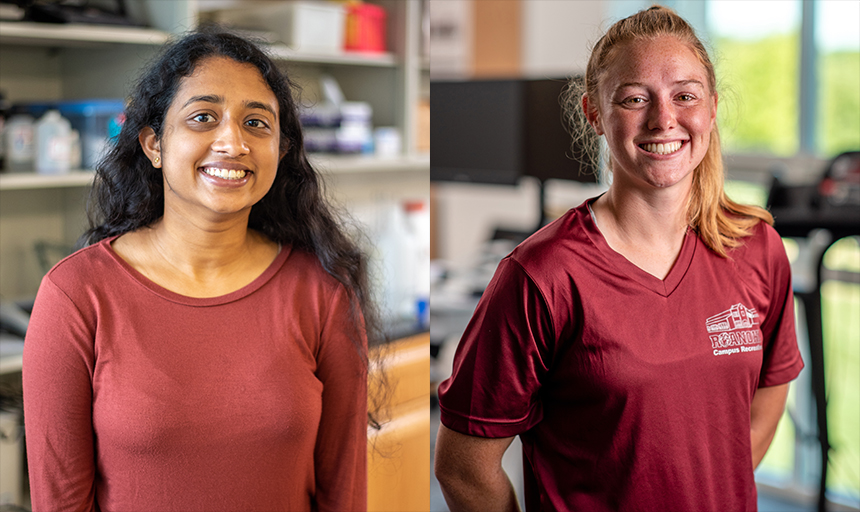Students present health research at national conference
October 11, 2021

Two Roanoke College students were invited to share their research at a national conference on Sept. 23.
Kavya Iyer ‘22 shared her study about obesity in the Roanoke Valley, while Bryn Haden ‘22 presented her study on perceptions of grocery access in the area. They presented their research at a virtual conference hosted by the National Institutes of Health titled “Food Insecurity, Neighborhood Food Environment, and Nutrition Health Disparities: State of the Science.”
Iyer and Haden presented together, as both of their projects focused on people’s perceptions of public health issues. Their joint presentation was called “Perceived Neighborhood Environments: Health Impacts and Catalysts for Change.” Their studies combined qualitative research with quantitative research, relying heavily on surveys of people throughout the Roanoke Valley.
This mix of qualitative and quantitative was “groundbreaking,” Haden said, and Iyer said that caught the attention of some NIH conference attendees.
“One thing that was really cool was that model that we used to address these things was actually the first of its kind in the country to be used,” Iyer said.
I have friends at bigger schools who are involved in undergrad research, but really all they can do is just hold the clipboard and kind of just be in the same room. Whereas...we're getting to start our own projects where [our professors] listen to us and think about our ideas, they help us along the way.
Bryn Haden '22
Iyer is a biochemistry major and math minor who is in the College’s Honors Program. She hopes to attend graduate school to study nutrition and epidemiology, and is looking to go into pediatric health. Haden is majoring in public health and health and exercise science, and minoring in sociology. She plans to pursue a master’s in public health and has set her sights on becoming a city planner.
Haden began doing research as a freshman, and worked closely with professors such as Dr. Liz Ackley, the Brian H. Thornhill Professor of Health and Human Performance. Ackley helped connect Haden and Iyer with the NIH conference. Haden, also a member of the Roanoke College women’s soccer team, said the opportunity to do meaningful, hands-on research as an undergraduate is one of her favorite aspects about life at Roanoke.
“I have friends at bigger schools who are involved in undergrad research, but really all they can do is just hold the clipboard and kind of just be in the same room,” Haden said. “Whereas...we're getting to start our own projects where [our professors] listen to us and think about our ideas, they help us along the way.”
As Haden and Iyer apply to graduate programs in the coming months, they said they feel confident, thanks to their research experiences at Roanoke.
“This is really going to help us stand out, compared to other candidates, because we're going to have up to three, four years of research under our belt already,” Haden said.